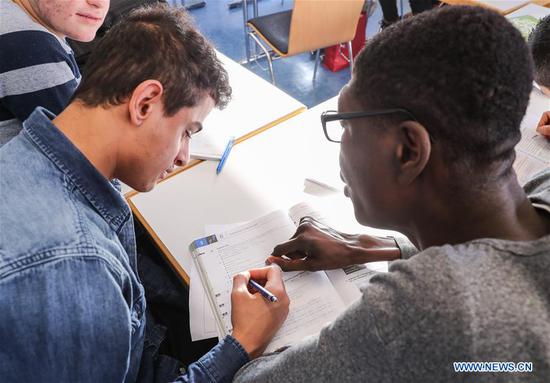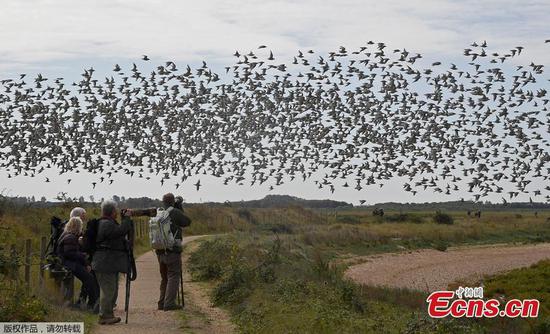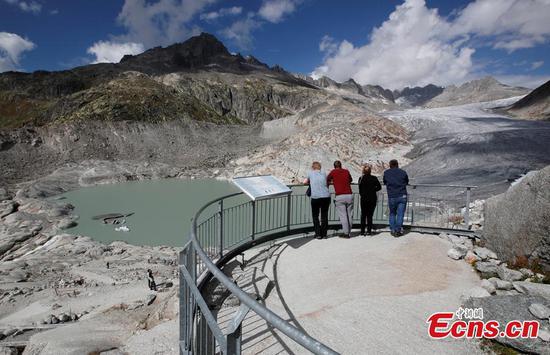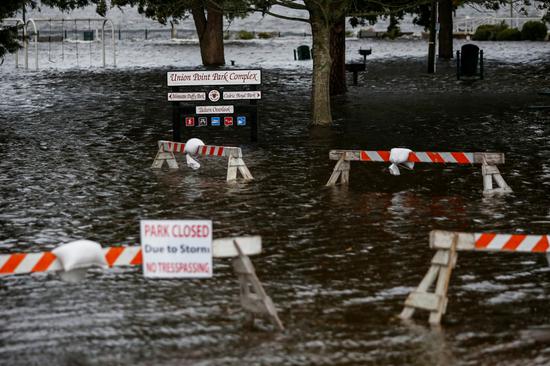
Immigrants study at a lauguage school in Berlin, Germany, on Jan 16, 2017. (Photo/Xinhua)
POTENTIAL KINGMAKER
Preliminary results show the Sweden Democrats remain as the country's third largest party, after the Social Democratic Party and the Moderate Party.
Despite winning with a less-than-expected support, the Sweden Democrats gained at the cost of the other two and are now in a powerful position. National elections in Sweden on Sunday ended in a near deadlock between the left and right political blocs, making the Sweden Democrats a potential kingmaker.
The two blocs have vowed not to collaborate with the Sweden Democrats, but neither of them have a majority on their own, as they each only won slightly over 40 percent of the votes in the general elections.
A minority government, like the incumbent Social Democrats and Greens alliance formed four years ago, will be in a weak position.
"Even if the Sweden Democrats weren't able to participate in the formation of the the new government, given its public support, the party will certainly have a bigger say in parliament and push for stricter immigration rules," said Tommy Moller, professor at the Department of Political Science of Stockholm University.
Jimmie Akesson, the Sweden Democrats leader, said the party wants to have a greater influence in politics. The party advocates a halt to all asylum seekers in Sweden and wants to send more immigrants back to where they came from.
"We increased our mandate in the Parliament. We will have an immense influence over what happens in Sweden in the next few weeks, the next few months, in the next few years. Nobody can take it away," he said.
DANGEROUS TREND
Over the weekend, up to 500 right-wing extremists marched through the small town of Koethen in eastern Germany, following a fatal incident in which the locals clashed with the asylum seekers.
There has been speculation that a 22-year-old German was killed in a fight with two Afghan asylum seekers in Koethen on Saturday, but the authorities of Saxony-Anhalt confirmed on Monday that there was no evidence of injuries causing his death and that he had mostly likely succumbed to a heart attack.
Anne-Marie Keding, the regional justice minister of Saxony-Anhalt, urged Germans not to believe in wild speculations on the internet.
Despite that, a spontaneous "march of sorrow" was joined by around 2,500 protesters, including many supporters of the far-right AfD, which has become now the largest opposition party.
German Chancellor Angela Merkel has recently accused the AfD of using another regretful death of a man to incite hatred against foreigners.
Last month, in the eastern German city of Chemnitz, right-wing extremists exploited a bloody act to incite citizens to protest. Footage circulating on social media supposedly showed the chase of suspected migrants after news circulated that a German man was stabbed to death that Sunday, allegedly by an Iraqi and a Syrian.
The German government condemned such behavior, saying that "such mobs, the hounding of people who look different or have a different background or the attempt to spread hate on the streets are things we do not accept."
Strongly condemning the far-right and xenophobic abuses, Federal President Frank-Walter Steinmeier said that "the shock of this act of violence was abused to carry alien hatred and violence on the streets of the city."
Hajo Funke, an expert on right-wing extremism, who taught at the Institute for Political Science of Free University of Berlin until 2010, told local media that this was a "dangerous" situation for Germany.
"The danger is that people resentful of certain ethnic groups fueled by Pegida will band together with neo-Nazi scenes of violence," said Funke.
Pegida stands for "Patriotic Europeans Against the Islamization of the Occident" in German. The group was founded in 2014 and regularly organizes large rallies to protest what it views as a threat posed by Islam and multiculturalism more generally to Western society.
Hans Pfeifer, an expert on right-wing extremism, said that racist sentiment does have a history in modern Germany going back to the 1970s, but what makes the situation more concerning today is the ability of the common people to easily accept right-wing activists.
"There are quite a lot of normal citizens from the neighborhood, and they do not feel it much trouble to march against refugees, against the government, side by side with people saluting Hitler," Pfeifer said. "I think this is ... becoming more and more dangerous."


















































